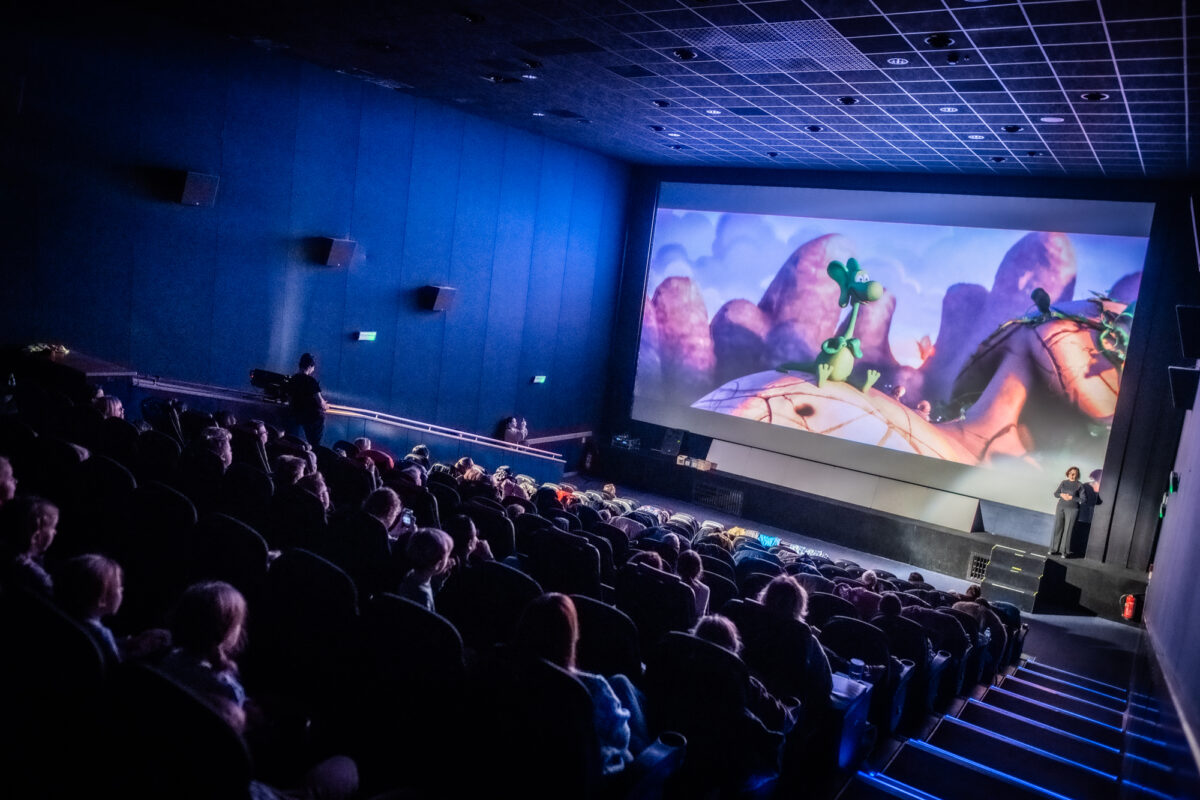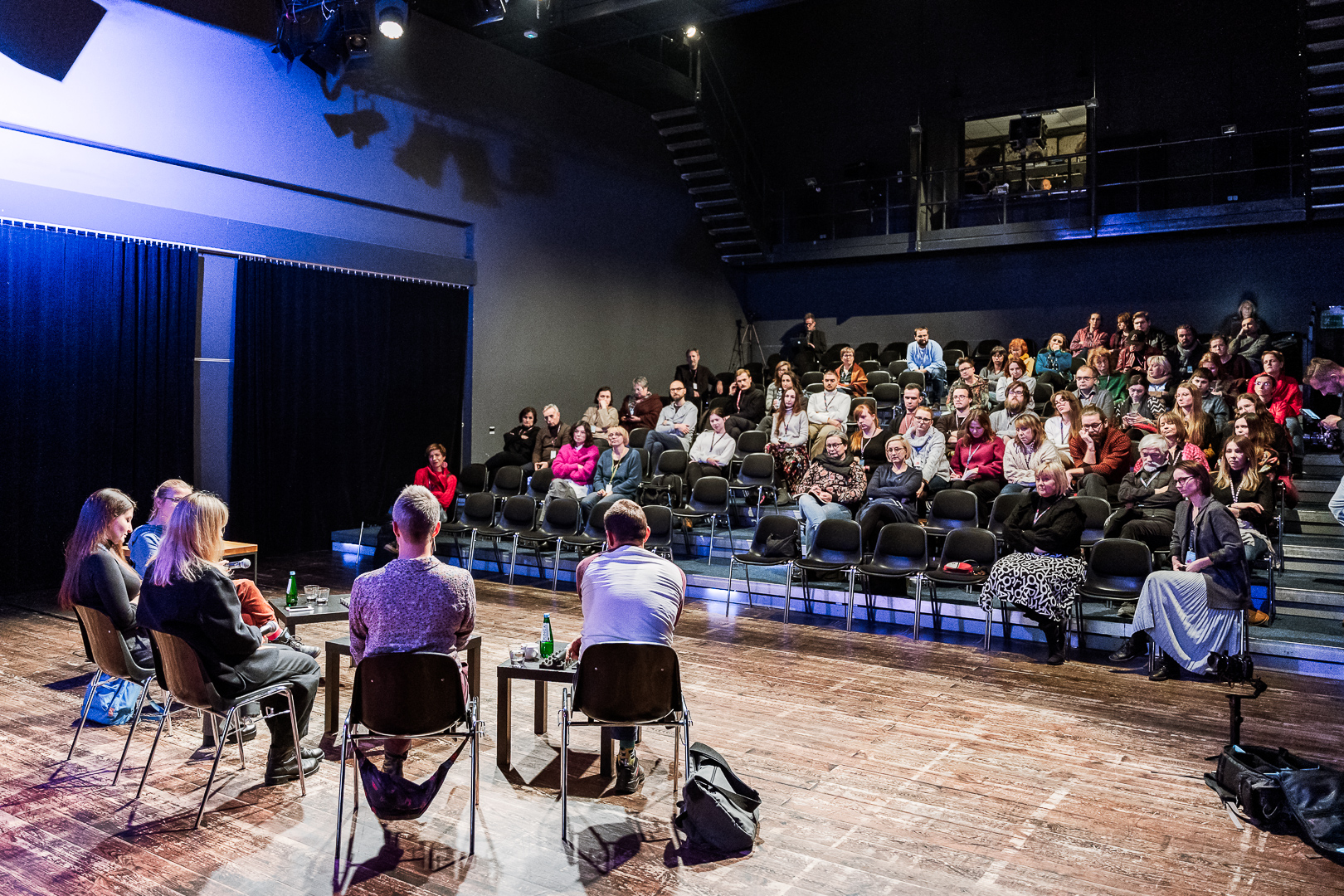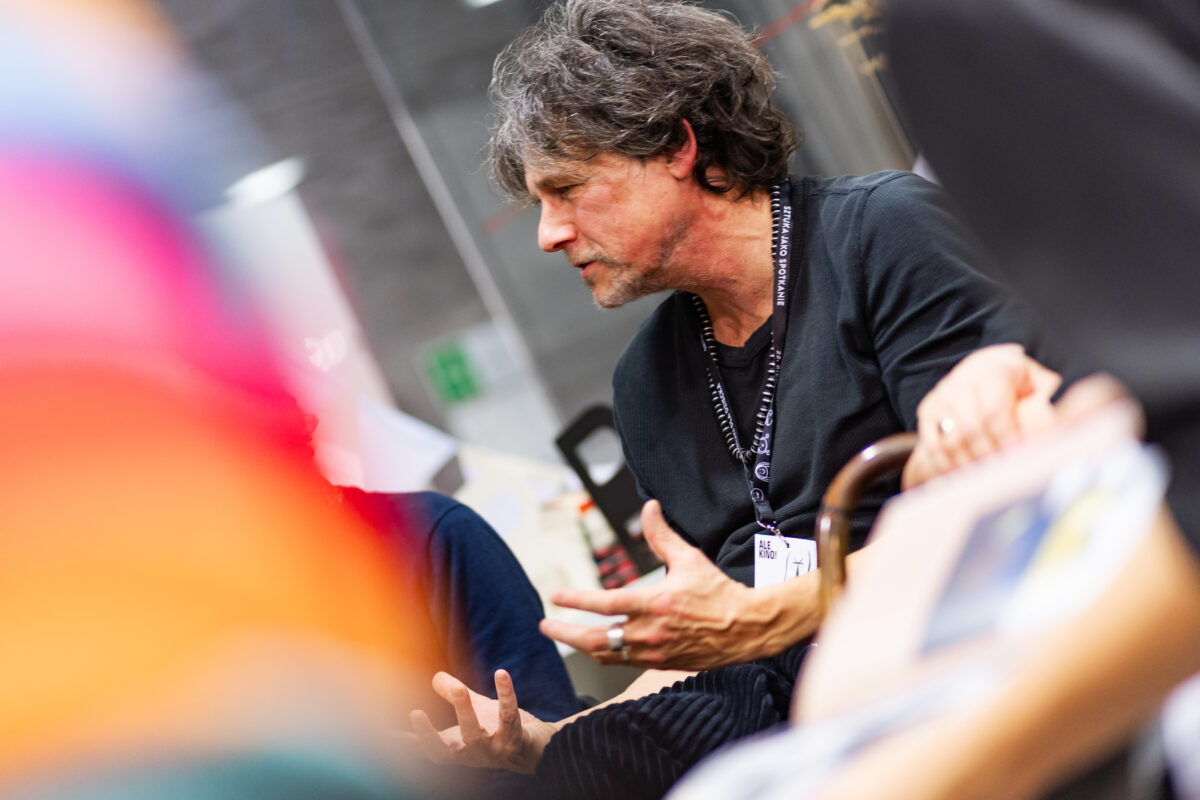
Submit a film to the Ale Kino Festival!
We have started recruiting films for the 43rd edition of Ale Kino!
EUROPEAN FILM FESTIVALS FOR CHILDREN AND YOUTH IN THE YEAR 2023 – a conversation organised by Ale Kino! Festival under the auspices of European Children’s Film Association ECFA, 13.12.2023

In 2020 the Ale Kino! Festival launched a tradition: a yearly online meeting in which festivals exchange experiences. Previous years’ edition went under the titles connected with the pandemic situation, but due to the current situation, this year’s panel was devoted to re-building audiences after COVID and ecological attitudes of the festivals.
Representatives from European festivals each commented on following issues:
FILEM’ON (INTERNATIONAL BRUSSELS CHILDREN’S FILM FESTIVAL) – Hilde Steessens
The FILEM’ON festival has seen an increase in audiences in Ghent and among school audiences, despite the earlier stress caused by the terrorist attack in Brussels.
Family audiences and teenagers remain an area for further work, although Steessens noted that engagement strategies have worked very well with teenagers. The festival tries to involve them at all levels: promotion, programming, jury selection. This gives a dynamic that attracts young people – even those who have not yet been active with the festival!
The festival makes every effort to be green, taking into account all contexts: among other things, it encourages the use of public transport, but knows that not all audiences are equally mobile. The organisers want to be inclusive and realistic.
The economic situation of the organisation is quite stable. The festival received more funding from the Flemish government in 2023 and less support from European institutions.
MŁODE HORYZONTY (YOUNG HORIZONS) INTERNATIONAL FILM FESTIVAL – Maciej Jakubczyk
In 2023, the organisation rebranded the name from Kino Dzieci [Kids Kino] to Młode Horyzonty [Young Horizons].
The festival met its attendance targets with commercial customers, but not with school audiences. At the same time, however, the unveiling in Wrocław, the festival’s second largest city, had the highest attendance ever.
Year on year, the festival also sees a lower audience for the online part.
There has been a green section at the festival for several years – it includes various films related to the topics of ecology and nature. This year, however, rebranding issues made the green policy difficult. However, the festival focused on reducing the transport of visitors by car and reduced the number of prints.
Stowarzyszenie Nowe Horyzonty [The New Horizons Association], under which the festival operates, received the lowest funding from the Ministry of Culture and National Heritage in its history, but was prepared for this situation and developed a variety of activities beyond film screenings.
JEF FESTIVAL – Iris Verhoeven
For JEF Festival, this was the best year ever: a record attendance of over 24,000 people was achieved.
The festival received additional financial and marketing support from the city of Antwerpen, which helped to broaden the audience. The festival is building on previous successes: cinema for the youngest audiences or a team of young programmers (12-16 years old), which numbered 30-40 this year.
The festival has decided to ticket Media Lab participation separately (previously it was included in the ticket) and this has not affected the drop in attendance. The organisers were also testing partnerships with theatres or opera to reach a different type of audience.
The festival does a lot on the subject of ecology. It offers a vegetarian menu and tries to invite as many guests as possible from Belgium and the Netherlands to reduce travel costs. It borrows a lot of material from other organisations and also lends its materials when needed.
Inflation is regulated in Belgium by automatic wage increases. Verhoeven pointed out that while this is an important safeguard for employees, it is also a challenge for the organisation.
Jerzy Moszkowicz remarked after these few speeches that festivals have good support from local governments and noted that perhaps new sources of support need to be sought – not necessarily central, but just local.
KRISTIANSAND INTERNATIONAL CHILDREN’S FILM FESTIVAL – Marion Røst Heimlund
The festival is still working to regain pre-pandemic audiences. One strategy is to visit politicians and present to them the scope and importance of the festival’s activities. Nothing happens without the support of the Norwegian Film Institute.
The festival involves children and young people, fitting into the curriculum and compulsory practices for secondary school students – involving them in the organisation and programming.
As the festival takes place in a small town, there is little need for car transport. Films with an environmental theme are always included in the programme and collaborations with environmentally-minded organisations are taken.
ZLIN FILM FESTIVAL – Markéta Pášmová
Festival audiences returned to the cinemas in numbers that can be compared to pre-pandemic times. Attendance reached 100,000 and more than half of the visitors were commercial audiences.
Each year the festival has tried to move communication more and more into the online space, reducing the amount of printed material. It has, however, left the printed catalogue.
Due to the infrastructure of the city, the use of cars is necessary. However, the transport of materials is reduced – films are sent electronically.
The economic situation of the festival is stable. Its budget consists of two parts: one comes from sponsors and the other from subsidies, i.e. the Ministry of Culture, the city region, the European Union. In case of insufficient subsidies, the organisers shorten the duration of the event by limiting the side programme (concerts or meetings).
SCHLINGEL – INTERNATIONAL FILM FESTIVAL FOR CHILDREN AND YOUNG AUDIENCE – Michael Harbauer
This year the festival recorded an attendance of 20,000 people. It is open to audiences unconnected to the school system and older than teenagers.
The organisers source films online. The festival has also succeeded in introducing tickets that can be used on public transport.
OULU INTERNATIONAL CHILDREN’S AND YOUTH FILM FESTIVAL – Mika Anttolainen
The Finnish Film Foundation will have a budget of €1,000,000 less next year. This will have a significant impact on the industry’s operations, resulting, among other things, in the suspension of the production of films for children and young people.
The festival is printing less and less materials. All screenings this year were digital and the festival hotel was Green Star Hotel Oulu – Finland’s first carbon-neutral hotel chain.
The festival runs an Oscar competition with one of the film schools, using films made by children and young people. It also organises “This is not a script”, a programme dedicated to young screenwriters in the Nordic countries. In collaboration with Wallaby Film School, it also organises film clubs.
JUNIOR FEST FESTIVAL – Judita Soukupova
The 16th edition of Junior Fest ended a month ago. The festival has undergone significant staff changes, but the focus is now on planning the next edition. Junior Fest takes place in six cities simultaneously over six days – most of which are small towns where it is easy to attract an audience. This year, the festival was attended by almost 14,000 spectators.
The organisers feel that it is necessary to build individual links with teachers in order to gain school audiences – a challenge for years to come.
The festival is reducing the number of prints, but has also decided to stay with the printed catalogue. It also organises environmental campaigns with various sponsors each year and tries to use public transport when possible.
Jerzy Moszkowicz noted that the issue of individual contacts with teachers has been extremely important for years – ECFA could devote more space to this topic.
INTERNATIONAL FILM FESTIVAL FOR CHILDREN AND YOUTH BUSTER – COPENHAGEN – Mariela Harpelunde Jensen
The 24th edition of the festival was attended by 10,000 school children and 10,000 family audiences. Films were also screened in a new outdoor venue – a tent built in Copenhagen’s protected nature area, Amma Fellow. This intervention had a positive impact on the number of tickets sold.
The focus on family audiences makes it easy for the festival to lose the interest of schools – in Denmark, year-round streaming is available from the Film Institute for educational purposes. This calls into question the point of trips to the cinema – the festival sees this as a serious problem, although it appreciates the benefits to schools in smaller towns.
OLYMPIA INTERNATIONAL FILM FESTIVAL FOR CHILDREN AND YOUNG PEOPLE – Pantelis Panteloglu
The festival has just come to an end. Excellent contact has been established with schools in the Pyrgos area, reaching around 10,000 children there. The festival sees children’s participation as a necessary requirement: films created by young people are screened and a variety of inclusive activities are provided. One of the projects involved 8085 young people.
Due to the location of the festival (300 kilometres from the nearest international airport – Athens), the use of transport is necessary: buses and shared cars are used.
The economic situation is stable. The festival has received additional funding from the town of Pyrgos and from the region, from a fund linked to the financial support received from the European Union.
INTERNATIONAL YOUNG AUDIENCE FILM FESTIVAL ALE KINO! – Marta Jodko
The festival reached a larger audience than in the previous year. The school screenings went well, while the afternoon screenings for teenage audiences still need work. Ale Kino! received the patronage of the Youth Council of the City of Poznań and also cooperated with the Short Waves Festival, which has a large young audience interested in short films.
The good attendance can be attributed to effective promotional campaigns, one of which was a collaboration with the publisher of the book “Aristotle and Dante Discover the Mysteries of the Universe”. Tickets for the screen adaptation of the novel sold out in the blink of an eye.
The festival collaborates with high schools in Poznań whose students volunteer and develops its offer for young programmers by organising curatorial workshops.
This year, the festival produced fewer gadgets, worked exclusively on digital copies of films and published only a PDF version of catalogue. The festival also decided to introduce new statuettes produced from recycled plastic.
Festival’s economic situation is stable. The budget was slightly lower than last year due to the loss of the sponsor, the National Bank. It was also a year of rebuilding the team.
The president of the ECFA, Pantelis Panteloglu, summarised the meeting.
He noted that we all festivals face the same difficulties: the main one is of course finances. Fundraising is not easy, as gathered festivals that do not have a mainstream focus and often operate locally rather than centrally, establishing real, close contacts with teachers, schools or family audiences. However, even in times of recession, culture is important and this thought guides all those involved in popularising cinema for children and young people.
Given the long-standing dedication and passion, and the important goals of those involved with festivals for young audiences, Pantelis Pateloglu noted that festivals for children and young people have the right to demand diverse institutional support. Cinema carries a quality and social context that popular streaming services cannot provide.
What requires further reflection are the issues of school audience acquisition and the obligation to have a green policy. It is worth remembering that online activity means more energy consumption, and that the local means green.
Jerzy Moszkowicz thanked all the guests for attending and wished them a Merry Christmas. This was followed by a five-minute video report from the 41st International Young Audience Film Festival Ale Kino!

We have started recruiting films for the 43rd edition of Ale Kino!

